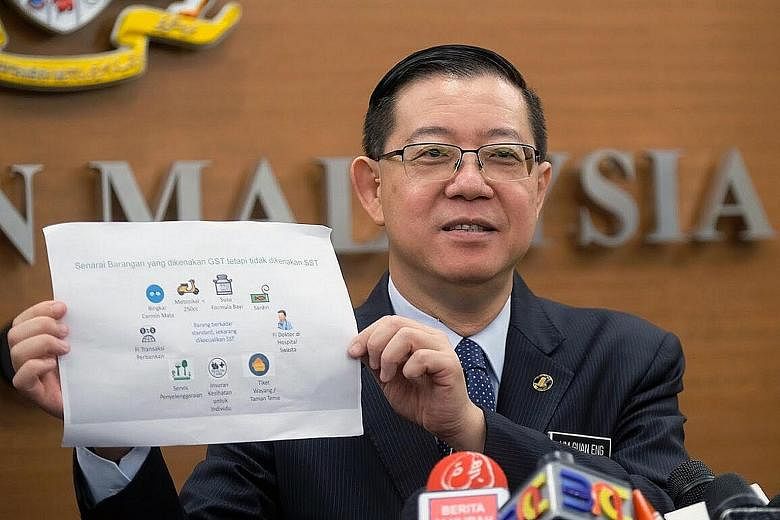Finance Minister Lim Guan Eng has insisted that Putrajaya's decision to replace the goods and services tax (GST) will put billions of ringgit back into the pockets of Malaysians, in his third defence of the move since Monday.
He said this in Parliament yesterday in response to a question on the Pakatan Harapan (PH) government's plan to reintroduce the sales and services tax (SST) on Sept 1, which has sparked concerns about another round of price increases.
"We don't deny the impact of the SST, (but) the GST is a cradle-to-grave tax. The suffering of the people under SST will be half that under the GST," he said in his reply to Ayer Hitam MP Wee Ka Siong, who was a minister in the previous Najib Razak administration.
Unlike the broad-based GST, which taxes 60 per cent of the items in the consumer price index basket, the SST covers only 38 per cent of the items, Mr Lim added.
Government estimates put revenue collection from the GST at RM44 billion (S$14.8 billion) a year compared to RM21 billion annually from the SST.
When the GST was introduced by the Umno-led Barisan Nasio-nal (BN) government three years ago, it led to price increases. Scrapping the GST was an election pledge made by the PH, which zero-rated the tax from 6 per cent on June 1 after winning the general election in May.
-
ESTIMATED REVENUE COLLECTION
-
RM44b From GST annually.
RM21b From SST annually.
While the cost of living is not seen to have come down significantly, scrapping the GST nonetheless slowed the inflation rate last month to 0.8 per cent, the lowest since it was 0.1 per cent in February 2015.
The GST was introduced in April 2015 to replace the SST.
Najib and his BN colleagues have repeatedly criticised scrapping the GST in recent days, insisting that the SST will be inflationary.
"Pakatan's promise in its election manifesto to lower the prices of goods hasn't been achieved. This will be a double whammy for the people," he said on Tuesday.
Speaking to reporters yesterday, Mr Lim acknowledged there will be a period of adjustment after the SST takes effect. But "in the long run, it will reduce cost of living" and drive the economy, he said.
The opposition Parti Islam SeMalaysia (PAS), which does not favour both taxes, insists that a "wealth tax" on corporate deposits and gains on the stock market would net RM52 billion annually.
Some experts and segments of the public have called on the government to review its decision to do away with the GST, which they say is a more transparent tax.
Former youth and sports minister Khairy Jamaluddin has gained some support for his suggestion that PH should consider reducing the GST rate rather than reintroduce SST, which "is inefficient with many leakages".
While Mr Lim agreed that the GST is more transparent, he said that this tax regime cannot continue because of "huge irregularities" in returning refunds to manufacturers.
The impact of the multi-stage tax on prices was compounded because the previous administration delayed or did not pay refunds for GST on inputs, he added.
The minister said he will reveal the problems with the GST refunds at a later date.

